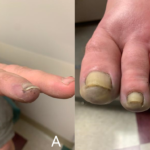Memory loss: Second only to headache, memory loss is possibly the most common complaint in APS. Despite a number of published psychiatric studies on APS, it is probable that the extent of the problem is still underestimated. Here’s one example from a patient I recently saw: a young woman with APS improved her word-finding score from 15% to 95% after three weeks of subcutaneous heparin. This sort of result is not uncommon in our own clinical experience when formal testing is undertaken.
Multiple sclerosis: In a recent patient survey, 32% of aPL-positive patients in our clinic had had a previous possible diagnosis of MS considered.4 This finding raises important issues. Firstly, differential diagnosis can be difficult. Secondly, we have seen APS patients in whom borderline aPL readings were dismissed as epiphenomena and yet in whom anticoagulation resulted in sustained clinical improvement.
Other neurological: Seizures are a feature of APS.4 Interestingly, in many patients the seizure frequency improves with anticoagulation and worsens with a falling international normalized ratio (INR). Recently, it has been estimated that up to 15% of cases of idiopathic teenage epilepsy may be related to aPL.5 Movement disorders of all descriptions can occur in APS and range from chorea to tics to parkinsonism. Balance problems are particularly common—and, as yet, underreported.
Heart and Lungs
Although the association between aPL and myocardial ischemia is well recognized, there still seems to be a wide range of figures published—between 5% and 15% prevalence of aPL in patients with myocardial infarction (MI), for example. Whatever the figure, the link is of extreme importance in terms of MI prediction and prevention. Sletnes et al., in a study of nearly 600 patients surviving an acute MI, found 13.2% positive for aPL.6 Further, a strong correlation between aPL and the risk of recurrent cardiovascular events in a series of young survivors of MI has been observed.
Although the current message is that routine aPL screening is not indicated in the evaluation of patients with an MI, I disagree. As in the world of obstetrics, a simple, cheap screening test (aPL) could have considerable benefit.
There are two other cardiovascular associations worth noting. First, my colleagues and I have published research on a series of patients with cardiac syndrome X and aPL. Second, increasing evidence points to a role for aPL in the development of accelerated vascular heart disease.7
Pulmonary hypertension: Although the link between APS and pulmonary hypertension has been known since 1983, the extent of the association remains uncertain.2 For example, we have seen a small number of cases of pulmonary hypertension with negative aPL tests at the time of evaluation, but in whom positive aPL and Venereal Disease Research Laboratory slide tests were recorded previously. This situation raises the possibility that in some cases, the thrombotic connection is being missed.

